 After trying to cheat its way to the top of the search engine pile, BMW has been dropped from global search engine, Google.
After trying to cheat its way to the top of the search engine pile, BMW has been dropped from global search engine, Google.
The German car manufacturer was booted off Google after it had employed the same kind of tactics used by porn sites to try and artificially inflate search engine rankings.
BMW’s dodgy practices were detected by Matt Cutts, a software engineer at Google who explained how the company had violated Google’s webmaster quality guidelines, specifically the principle of “Don’t deceive your users or present different content to search engines than you display to users.”
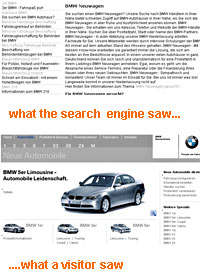 As he explains in his blog, search engine ‘bots’ arriving at the BMW site would see a page full of keyword-loaded text, which had been optimised to ensure a high search engine ranking.
As he explains in his blog, search engine ‘bots’ arriving at the BMW site would see a page full of keyword-loaded text, which had been optimised to ensure a high search engine ranking.
But what the search engine saw and what greeted visitors were two quite separate things, as a piece of JavaScript would immediately redirect visitors to a completely different website.
Keyword-optimised ‘fake’ pages created purely to attract search engine robots are known as ‘doorway’ or ‘gateway’ pages and have long been employed by the porn industry to boost the profile of a site.
Google’s ‘delisting’ of BMW means that searches for terms like “BMW” or “BMW Australia” will now only return results for the global site and not regional sites.
Moreover, bmw.com.de’s PageRank – an algorithm used by Google to assign a ‘popularity ranking’ to every page on the web – has been reset to zero.
It’s probable that BMW enlisted the help of Search Engine Optimisation (SEO) experts who use a variety of cunning tricks to boost a client’s search engine ranking.
Although there are many perfectly fair and legal ways of optimising a site’s search engine ranking, it’s not unusual to see less ethical “black hat” tactics being employed, usually by dodgy gambling and pornography sites.
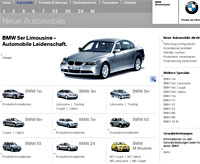 BMW now have the dubious honour of becoming one of the highest profile companies to have a website effectively blacklisted by Google, by having their all-important PageRank reset to Zero (German camera manufacturer ricoh.de are also set to be delisted).
BMW now have the dubious honour of becoming one of the highest profile companies to have a website effectively blacklisted by Google, by having their all-important PageRank reset to Zero (German camera manufacturer ricoh.de are also set to be delisted).
Matt Cutts’ blog reports that at least some of the JavaScript-redirecting pages have already been removed from bmw.de, but before they can be ‘reincluded’, Google’s webspam team will need a ‘reinclusion request’ along with details on who created the doorway pages.
Although it’s good to see search engine cheats getting slapped down, in reality it’s not going to make a great deal of difference to BMW in the long term. But we suspect that some P45 forms are being handed out as we speak…
 Now holding the record for the fastest-selling debut album in the UK, the success of young British indie-rockers Arctic Monkeys shows how the Web has changed both the way in which bands promote and market themselves and how people find new music.
Now holding the record for the fastest-selling debut album in the UK, the success of young British indie-rockers Arctic Monkeys shows how the Web has changed both the way in which bands promote and market themselves and how people find new music. For less than the cost of a handful of flyers, bands can set up their own Websites, offer free downloadable tunes, sell merchandise, maintain free email mailing lists and invite a dialogue with their fans.
For less than the cost of a handful of flyers, bands can set up their own Websites, offer free downloadable tunes, sell merchandise, maintain free email mailing lists and invite a dialogue with their fans. With a growing fanbase clambering for more, it wasn’t long before record companies were begging to sign up the band, and last week’s album release on Domino Records saw the Artic Monkeys record-breaking leap up the charts.
With a growing fanbase clambering for more, it wasn’t long before record companies were begging to sign up the band, and last week’s album release on Domino Records saw the Artic Monkeys record-breaking leap up the charts. How do ‘Normal’ phones work?
How do ‘Normal’ phones work? VoIP in an ideal world
VoIP in an ideal world Security implications and therefore costs are a significant issue. The increase in network traffic that VoIP can bring can have other cost implications, such as ensuring firewalls are “chunky” enough to support the VoIP traffic.
Security implications and therefore costs are a significant issue. The increase in network traffic that VoIP can bring can have other cost implications, such as ensuring firewalls are “chunky” enough to support the VoIP traffic. Love music? Love iPods? You might
Love music? Love iPods? You might 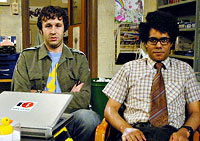 Couple of content quickies –
Couple of content quickies –  ?The tumbrels are resounding for enemies of Google European head, and former T-Mobile boss, Nikesh Arora, following the “disappointing” financial results. In fact, the results were trivially down, but that was enough, and his head will be anxiously sought by Google in the US, say our stray packet interception team.
?The tumbrels are resounding for enemies of Google European head, and former T-Mobile boss, Nikesh Arora, following the “disappointing” financial results. In fact, the results were trivially down, but that was enough, and his head will be anxiously sought by Google in the US, say our stray packet interception team. And the City doesn’t like people it can’t cut down to size. Give them an excuse, and they will jump on you, which is what happened. That $40m is the excuse they’ve been waiting for. “Misled us with the forecast!”
And the City doesn’t like people it can’t cut down to size. Give them an excuse, and they will jump on you, which is what happened. That $40m is the excuse they’ve been waiting for. “Misled us with the forecast!”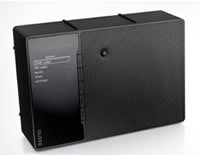 DAB radio (Digital Audio Broadcasting) is really taking off in the UK.
DAB radio (Digital Audio Broadcasting) is really taking off in the UK. The continued growth of DAB is hoped to receive a further boost as uber-regulator, OfCom, plans to release further, new DAB-able spectrum.
The continued growth of DAB is hoped to receive a further boost as uber-regulator, OfCom, plans to release further, new DAB-able spectrum.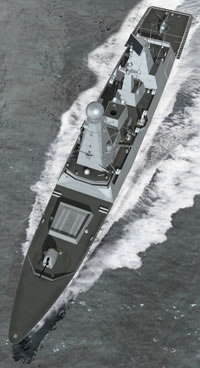 You may have heard about yesterdays launching of the latest UK warship – HMS Darling (its ninth incarnation), a Type 45 Destroyer.
You may have heard about yesterdays launching of the latest UK warship – HMS Darling (its ninth incarnation), a Type 45 Destroyer. If you’re interested in buying one, do let
If you’re interested in buying one, do let  Inga Chernyak, until recently, had a legal clerk job at an IP law firm in New York City. On the 26 January she was called in to the firms HR department and fired.
Inga Chernyak, until recently, had a legal clerk job at an IP law firm in New York City. On the 26 January she was called in to the firms HR department and fired.  There may be those who think that it’s pretty obvious that is you work in an IP firm; wanting to train as an IP lawyer; you hold views that IP law is over restrictive; then have your name and photo featured in an article that starts by describing how to circumvent CD DRM protection and are a founder of NYU chapter of the Free Culture movement – you’re going to end up in trouble said IP law firm.
There may be those who think that it’s pretty obvious that is you work in an IP firm; wanting to train as an IP lawyer; you hold views that IP law is over restrictive; then have your name and photo featured in an article that starts by describing how to circumvent CD DRM protection and are a founder of NYU chapter of the Free Culture movement – you’re going to end up in trouble said IP law firm.  BBC World have been busy bunnies of late, signing distribution deals all over the globe.
BBC World have been busy bunnies of late, signing distribution deals all over the globe. The video streams include the adverts that would be shown if BBC World were being shown on the TV in the region. As yet, BBC World aren’t charging their advertisers any extra to splash them on mobile screens – they’re seeing it as added value for them
The video streams include the adverts that would be shown if BBC World were being shown on the TV in the region. As yet, BBC World aren’t charging their advertisers any extra to splash them on mobile screens – they’re seeing it as added value for them In the 3/Hutchinson Australia deal, the subscribers are being asked to pay Au$4/month for unlimited access, Au$2/day or Au$0.50/two minutes.
In the 3/Hutchinson Australia deal, the subscribers are being asked to pay Au$4/month for unlimited access, Au$2/day or Au$0.50/two minutes.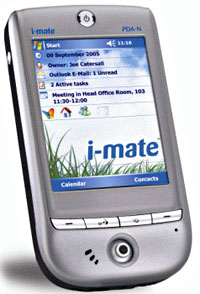 They’ve been bustier than Jock McHasty in a rush at i-mate, as the PDA/smartphone vendor releases another addition to their range, the i-mate PDA-N – the company’s first GPS PDA.
They’ve been bustier than Jock McHasty in a rush at i-mate, as the PDA/smartphone vendor releases another addition to their range, the i-mate PDA-N – the company’s first GPS PDA. The front of the slim device is dominated by a 2.83″ 240×320 pixels transmissive TFT-LCD screen supporting 64k colours, with a row of four buttons and a joystick below.
The front of the slim device is dominated by a 2.83″ 240×320 pixels transmissive TFT-LCD screen supporting 64k colours, with a row of four buttons and a joystick below.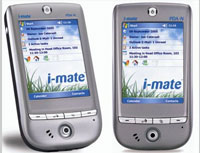 According to I-mate, the PDA-N notches up a rated battery life of 5 hours in GPS mode and 8 hours playing a looped video.
According to I-mate, the PDA-N notches up a rated battery life of 5 hours in GPS mode and 8 hours playing a looped video.